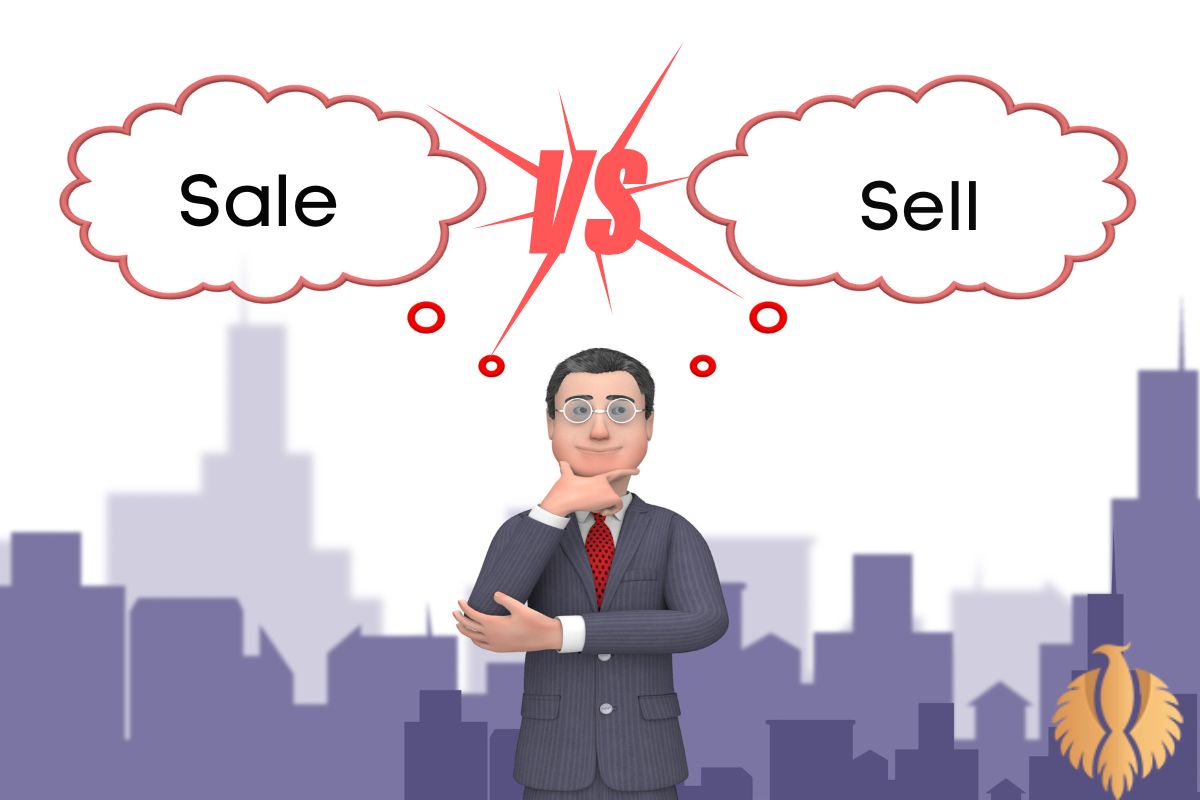“sale” and “sell” are related terms in the world of commerce, but they occupy different grammatical roles and contexts.
“Sale” is a noun that refers to the event or situation in which goods are sold or the exchange of goods for money, while “sell” is a verb that signifies the action of transferring ownership of goods or services in exchange for payment.
Understanding the differences between these two terms is essential for effective communication in business and everyday transactions.
![a infographic for Sale Vs Sell: Differences + Examples + Usage [2025]](https://phoenixenglishlang.com/wp-content/uploads/2024/02/unnamed.png)
Important Points:
- Grammatical Role: “Sale” is a noun used to describe the act of selling or the occasion when items are made available to buyers, such as in a “clearance sale” or “big sale event.” In contrast, “sell” is the verb form, denoting the action taken by an individual or organization when they offer goods or services to customers.
- Contextual Usage: The usage of “sale” and “sell” can vary significantly depending on the context. For example, you might “sell” your old books (action), whereas there may be a “sale” at a bookstore offering discounts (event). Recognizing when to use each term properly is crucial for coherent expressions in both speech and writing.
- Tense Application: “Sell” can be conjugated to reflect different tenses (e.g., “sells,” “sold,” “selling”), allowing it to fit into various sentence structures effectively. On the other hand, “sale” remains consistently a noun, emphasizing the importance of context to convey the intended message correctly.
- Related Expressions: Understanding phrases that incorporate both terms will enhance comprehension. For instance, in a sentence like “We are having a sale this weekend, and I plan to sell my handcrafted jewelry,” both “sale” and “sell” work together to convey a complete idea.
- Practical Examples: Utilizing examples in real-life scenarios can help illustrate the distinct meanings of “sale” and “sell.”
By practicing their use in demonstrations or conversations, learners can reinforce their understanding and gain confidence in their communications.
You might also enjoy:Which of the Following: Definition + Complete Usage + Grammar
As we explore the topic of “Sale Vs. Sell: Differences + Examples + Usage [2025],” this guide will provide an in-depth look at the definitions, usages, and contextual applications of these two vital terms.
We will engage with modern teaching strategies designed to make these concepts accessible and enjoyable, enabling learners to clearly distinguish between the two and enhance their vocabulary and communication skills.
—
In the world of commerce and trade, clarity in language is paramount.
The distinction between “sale” and “sell” is foundational for anyone engaged in business or daily transactions, yet it can often be a source of confusion for English learners and even seasoned speakers.
Misusing these terms can lead to misunderstanding and miscommunication, particularly in verbal or written businesses contexts.
With the approach of contemporary learning methodologies in mind, the 2025 Method promotes engaging ways to internalize these concepts.
By combining visual aids, interactive practices, and real-world applications, learners can build their competencies around these terms while enjoying the process.
At its essence, “sale” locks in the concept of a transactional event, reminding us of the bustling exchanges occurring in marketplaces and online shops.
For example, phrases like “end-of-season sale” or “flash sale” frequently pop up in advertisements, enticing customers to engage with promotional opportunities.
In contrast, “sell” embodies the action, reflecting the dynamic process behind these transactions, such as when a seller negotiates terms or interacts with buyers at a stall or through digital platforms.
As we dive deeper into the discussion of “Sale Vs. Sell,” we will analyze practical examples and relevant contexts that highlight the differences and similarities between these terms.
This exploration will equip learners with the knowledge necessary to use both “sale” and “sell” effectively, ensuring they communicate with confidence in a variety of business scenarios—whether writing a marketing proposal or having a conversation about a product at a store.
The goal is not just to memorize distinctions but to engage fully with the language, embracing opportunities to practice and apply these terms in real-life situations.
You Might Also Enjoy:Reinforce Vs Reenforce: 10 Differences + Examples [2025]
Sale or Sell?
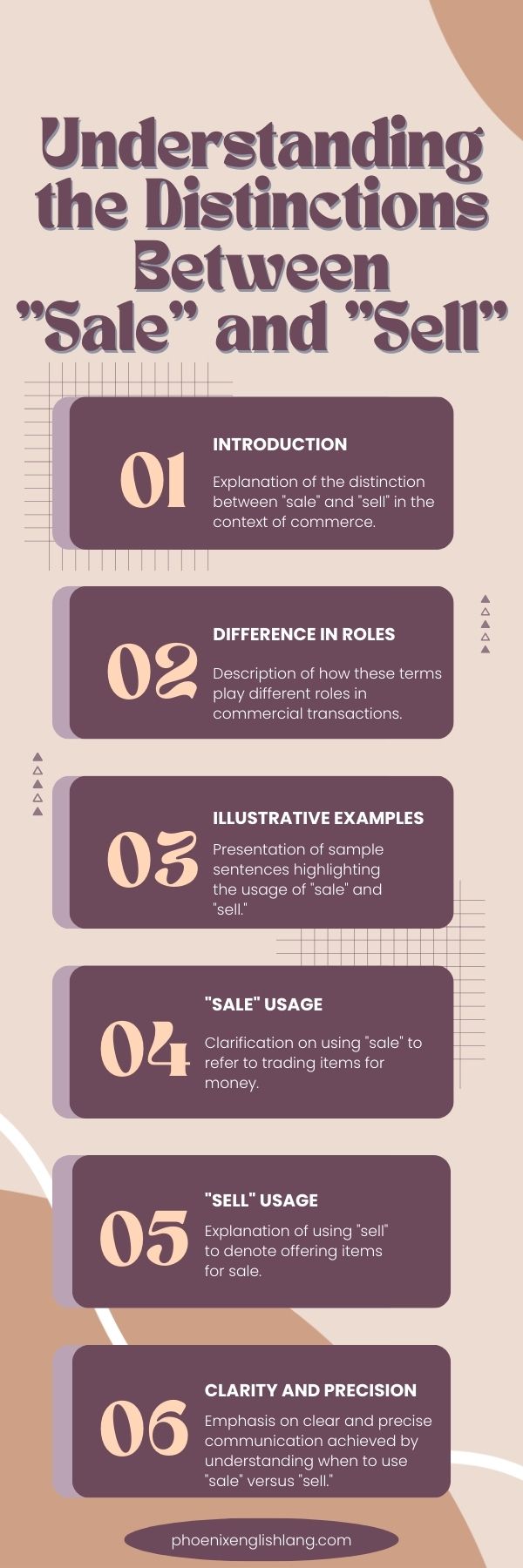
In the year 2024, let’s delve into the distinctions, examples, and usage of “sale” versus “sell.”
These terms may seem similar, but they play different roles in the realm of commerce.
To illustrate, consider the following sentences that I often use in my classes:
“The store’s annual clearance sale attracted a multitude of customers,” and She totally sells her cool handmade crafts online.
When we know when to say “sale” to mean trading things for money and “sell” to talk about offering stuff for sale, we can talk real clear and precise.
You might also enjoy:Where Does “How is your Day Going?” Originate From?
Definition and Meaning
The term “sale” refers to the act of exchanging goods or services for money or other valuable consideration.
On the other hand, “sell” is the action of offering goods or services for purchase.
While both terms are related to commercial transactions, they have distinct roles in the process.
The distinction between “sale” and “sell” lies in their definition and meaning.
In my classes, I often emphasize the importance of understanding the nuances of these terms to communicate effectively.
“Sale” is all about swapping stuff or doing some work for cash or something valuable.
It signifies the transactional aspect of commerce, highlighting the moment when a purchase is made.
On the other hand, “sell” is the action of offering goods or services for purchase.
It encompasses the broader process of marketing, promoting, and making products or services available to potential buyers.
By grasping this distinction, individuals can navigate conversations and business transactions with precision, ensuring clarity and avoiding any confusion that may arise from using these terms interchangeably.
You might also enjoy:Interested In or On: The Differences + Examples [2025]
20 examples of sell

- I want to sell my old laptop and buy a new one.
- The company sells high-quality furniture at affordable prices.
- She sells handmade soaps and candles at the local market.
- They sell tickets for the upcoming concert.
- The bookstore sells a wide range of books, including bestsellers and classics.
- He sells his artwork online through his personal website.
- The real estate agent is trying to sell a beautiful beachfront property.
- The grocery store sells fresh produce and pantry staples.
- The car dealership sells both new and used vehicles.
- They sell electronic gadgets like smartphones, tablets, and laptops.
- The bakery sells delicious pastries and cakes.
- The clothing store sells trendy fashion items for men and women.
- The online marketplace allows individuals to sell their used items.
- The toy store sells a variety of toys for children of all ages.
- The company sells software solutions for businesses to streamline their operations.
- The farmer sells fresh eggs and organic vegetables at the farmers’ market.
- The jewelry store sells exquisite diamond rings and necklaces.
- The pet store sells pet supplies, including food, toys, and accessories.
- The art gallery sells paintings and sculptures created by local artists.
- The travel agency sells vacation packages to popular tourist destinations.
You might also enjoy:What Kind of Vs What Kinds of – Differences + Examples [2025]
20 examples of sale

- The store is having a clearance sale on all winter clothing items.
- The online retailer is offering a buy-one-get-one-free sale on selected electronics.
- The car dealership is having a summer sale, offering discounts on all new models.
- The local bakery is having a flash sale, offering 50% off on all pastries for a limited time.
- The furniture store is having a weekend sale, with up to 70% off on selected items.
- The department store is having a back-to-school sale, offering discounts on school supplies and clothing.
- The online bookstore is having a summer reading sale, with discounted prices on best-selling novels.
- The grocery store is having a buy-more-save-more sale, offering discounts on bulk purchases.
- The beauty salon is having a spa package sale, offering discounted rates on massages and facials.
- The electronics store is having a Black Friday sale, with doorbuster deals on TVs and laptops.
- The toy store is having a holiday sale, offering discounts on popular toys and games.
- The sports retailer is having an end-of-season sale, with markdowns on athletic apparel and equipment.
- The online travel agency is having a summer vacation sale, offering discounted rates on hotel bookings.
- The home improvement store is having a kitchen and bath sale, with discounts on cabinets, fixtures, and appliances.
- The clothing boutique is having a sample sale, offering discounted prices on designer clothing samples.
- The shoe store is having a buy-one-get-one-halvif-off sale on all footwear.
- The pet store is having a pet food sale, offering discounts on various brands and flavors.
- The jewelry store is having a Valentine’s Day sale, with special prices on engagement rings and necklaces.
- The outdoor gear retailer is having a camping gear sale, offering discounts on tents, sleeping bags, and hiking equipment.
- The art supply store is hang an art supplies clearance sale, with discounted prices on paints, brushes, and canvases.
Examples
To show you how things are different, check out these examples:
a) Sale:
– “The store is having a sale on all clothing items this weekend.”
– ” The company totally crushed it last quarter with a major boost in sales.”
b) Sell:
– ” I’m thinking of selling my old car and getting a brand new one.”
– “She sells handmade jewelry online.”
In this section, we will delve into the definition and meaning of “sale” and “sell” as verbs.
We will provide examples and incorporate sentences that are commonly used in language learning classes to enhance understanding.
You might also enjoy:Too Cute Meaning Vs To Cute (To Vs Too) + Examples
Definition and Meaning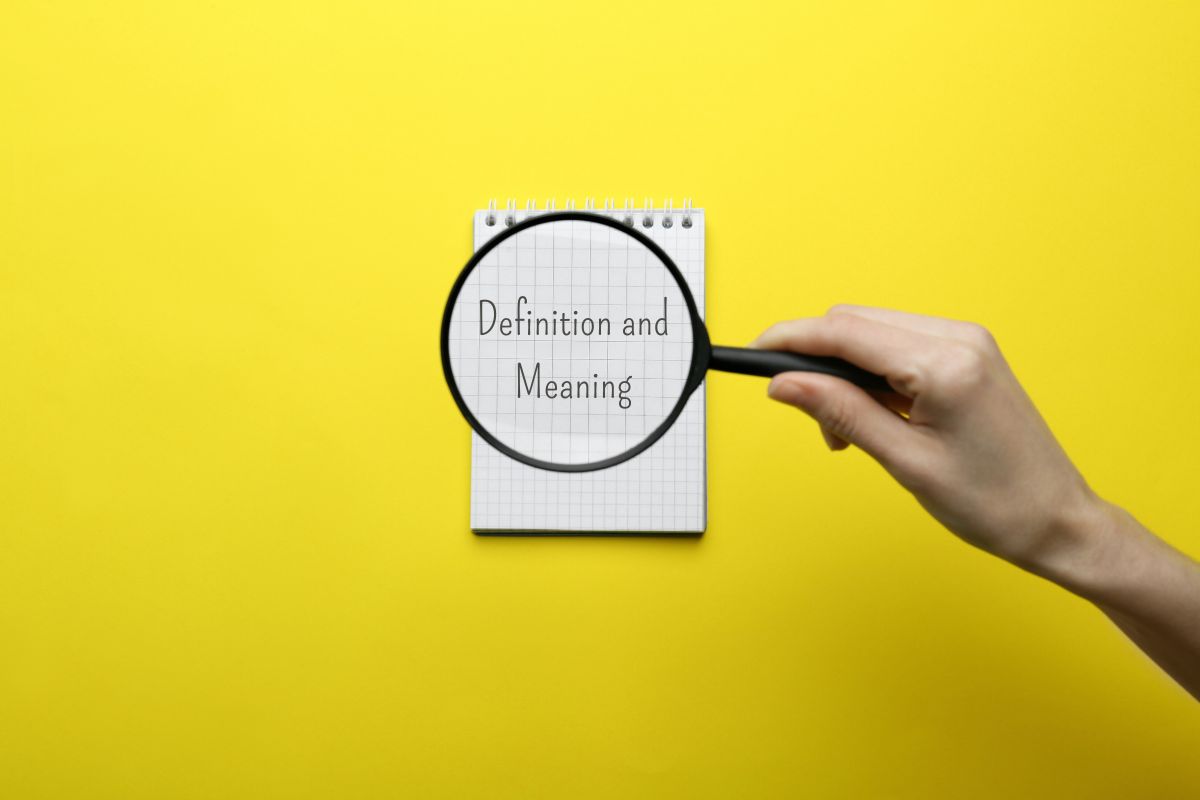
a) Sale (verb):
– The verb “sale” refers to the act of exchanging goods or services for money or other valuable consideration.
– Example sentence: ” The store is gonna have a huge sale next week where they’re gonna put all their stuff up for grabs.”
b) Sell (verb):
– The verb “sell” denotes the action of offering goods or services for purchase.
– Example sentence: “She sells handmade crafts at the local market every Saturday.”
Examples
a) Sale (verb):
– “The company decided to put their products on sale to attract more customers.”
– “During the holiday season, many stores have sales to boost their revenue.”
b) Sell (verb):
– “He sells vintage records online and has a loyal customer base.”
– ” They want to sell their house quickly because they are moving.”
Usage
a) Sale (verb):
– Use “sale” as a verb when referring to the act of offering goods or services for purchase at a discounted price or for promotional purposes.
– Example sentence: “The store manager decided to sale all winter clothing items at a 50% discount.”
b) Sell (verb):
– Use “sell” as a verb when describing the action of offering goods or services for purchase without emphasizing discounts or promotions.
– Example sentence: ” The artist just sells her paintings straight to collectors.”
You might also enjoy:How Are You Fairing or Faring? Differences + Examples
Incorporating Language Learning Sentences
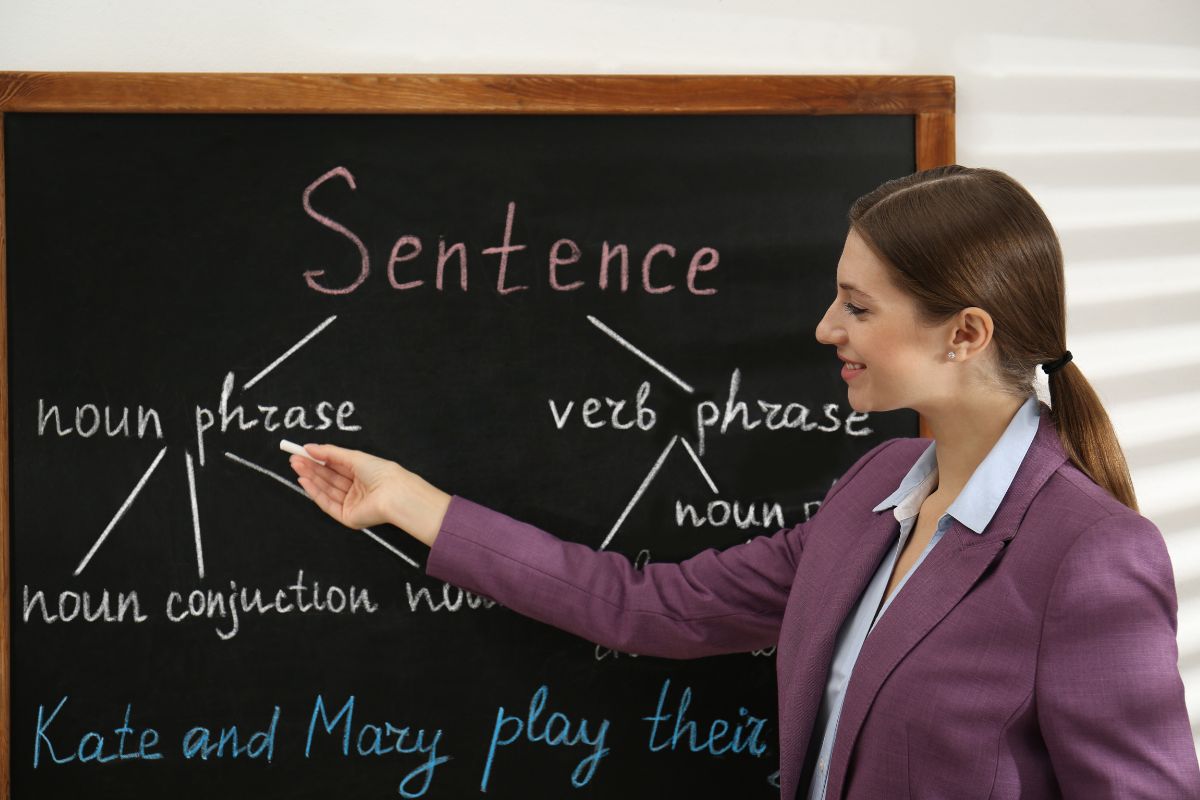
a) Sale (verb):
– Today, we’re gonna talk about how to use the word ‘sale’ to talk about stuff being on sale and promotions.
– “Can you create a sentence using the verb ‘sale’ to describe a special offer?”
b) Sell (verb):
– “Let’s practice using the verb ‘sell’ in sentences about personal transactions and business activities.”
– “Please construct a sentence using the verb ‘sell’ to describe someone offering a product for purchase.”
Understanding the nuances of using “sale” and “sell” as verbs is crucial for effective communication.
By incorporating examples and sentences commonly used in language learning classes, we can enhance comprehension and application of these terms in various contexts.
In this section, we will delve into the definition and meaning of “sale” and “sell” when used as nouns.
We will provide examples using sentences that are commonly used in language classes to enhance understanding.
Sale as a Noun
The noun “sale” refers to the act of exchanging goods or services for money or other valuable consideration.
It represents the transaction itself, emphasizing the process of buying and selling. Here are some examples:
- a) “The store’s annual clearance sale attracted a large crowd.”
- b) “She made a significant profit from the sale of her artwork.”
- c) “The company’s sales have been steadily increasing over the past year.”
Sell as a Noun
While “sell” is primarily used as a verb, it can also function as a noun in certain contexts.
As a noun, “sell” refers to the act of offering goods or services for purchase. Here are some examples:
a)” His conclusive chops make him a natural at the sell.”
b)” They completely nailed it with the sales of their new product. It was way further of a megahit than they allowed .”
c)” She’s notorious for being really good at sealing the deal painlessly.”
You Might Also Enjoy: Top 60 Most Common Simple Sentences In English
Sentence Examples
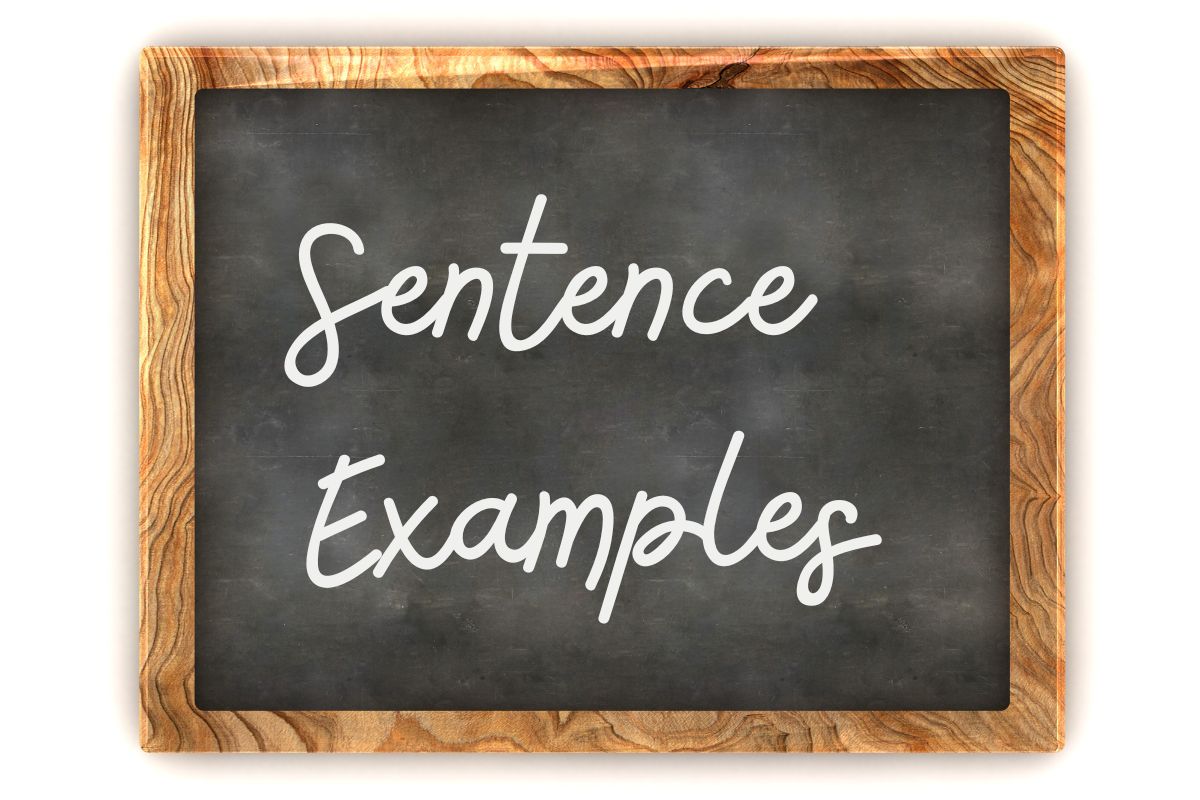
To further illustrate the usage of “sale” and “sell” as nouns, here are some sentences that are commonly used in language classes:
- a) ” The store’s clearance sale was like a super awesome chance to find stuff on sale, you know?”
- b) “The company’s sales have been steadily increasing, indicating a positive trend.”
- c) “His convincing sell of the product impressed the potential buyers.”
Understanding the usage of “sale” and “sell” as nouns is important for effective communication.
By incorporating these terms correctly in sentences, you can enhance your language skills and convey your message accurately when discussing commercial transactions, promotions, or personal exchanges.
Usage:
In this section, we will delve into the usage of “sale” and “sell” to ensure clear and effective communication.
By understanding their appropriate contexts, you can enhance your language skills and convey your message accurately.
Using “Sale” in Context
When discussing commercial transactions, promotions, or revenue, it is important to use “sale” appropriately. Here are some sentences that exemplify its usage:
– “The store’s annual clearance sale attracted a large number of customers.”
– ” During the holiday season, lots of stores have these really great sales that they do to try and make more money.”
– ” The sales numbers of the company have been going up steadily in the past year.”
Employing “Sell” in the Right Way

To describe the action of offering goods or services for purchase, it is crucial to use “sell” correctly. Consider the following sentences as examples:
– “I am planning to sell my old car and invest in a more fuel-efficient model.”
– “The local farmer sells fresh produce at the weekly market.”
– “She successfully sells her handmade crafts online, reaching customers worldwide.”
You might also enjoy: Performed Vs Preformed: Which One Is Correct? + Examples [2024]
Differentiating Verb Forms
Understanding the verb forms of “sell” can further enhance your language proficiency. Here are some sentences that demonstrate its conjugation:
– “He sells homemade baked goods every Saturday at the farmer’s market.”
– “They are currently selling their house and searching for a new one.”
– “The antique dealer sold the rare painting for a substantial amount.”
Derivatives for Added Clarity
Both “sale” and “sell” have derivatives that can be used to specify individuals or roles. Consider the following sentences:
– “The salesperson provided excellent customer service, resulting in increased sales.”
– ” The seller knew a lot about the product and answered all of my questions.”
Understanding when to use “sale” or “sell” is crucial for clear communication. Here are some guidelines
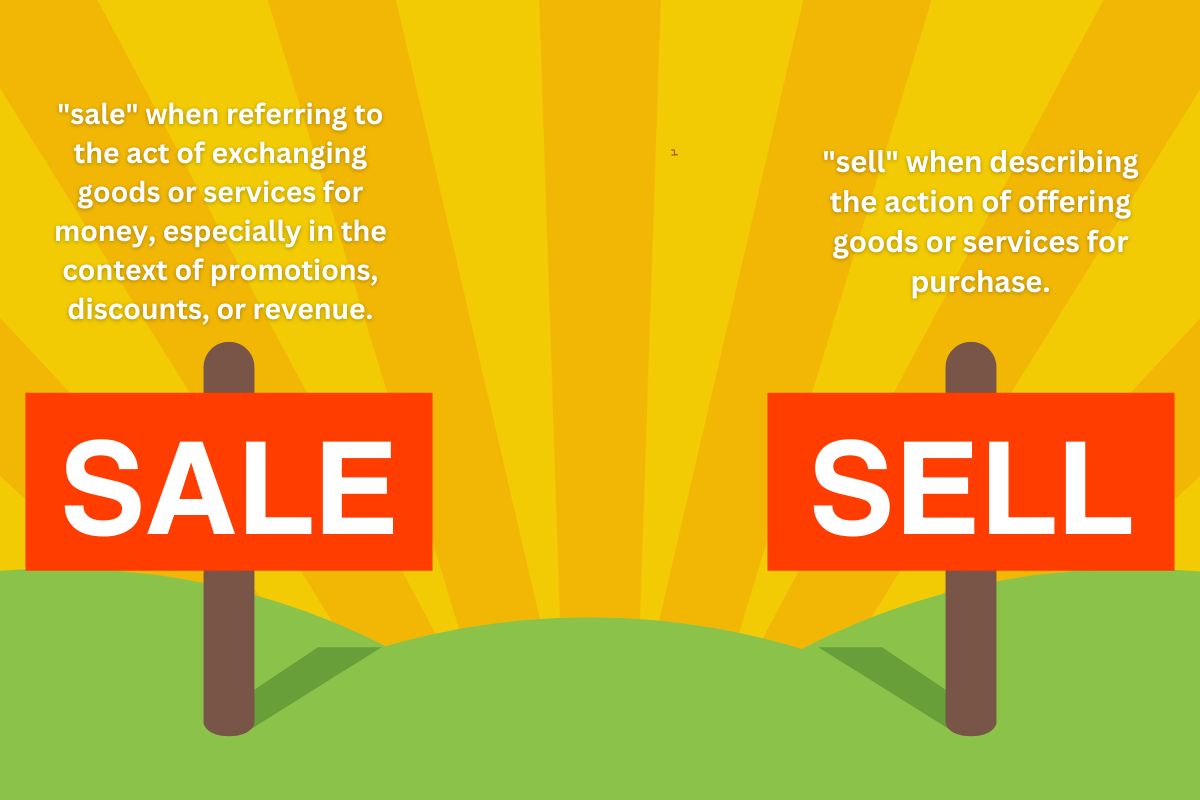
a) Sale
– Use “sale” when referring to the act of exchanging goods or services for money, especially in the context of promotions, discounts, or revenue.
– Examples: “Black Friday sale,” “annual clearance sale,” “record-breaking sales.”
b) Sell
– Use “sell” when describing the action of offering goods or services for purchase.
– Examples: “I want to sell my house,” “They sell organic produce,” “She sells insurance policies.”
By utilizing “sale” and “sell” appropriately in your language, you can ensure clear communication in various contexts.
Whether discussing commercial transactions, promotions, or personal exchanges, understanding the correct usage of these terms will enhance your language skills and convey your message accurately.
You might also enjoy:Emersion Vs Immersion: Meaning, Differences, and Examples
Additional Considerations
a) Verb Forms:
– “Sell” is a verb that can be conjugated in various tenses, such as “sells,” “selling,” and “sold.”
– “Sale” is a noun and does not have verb forms.
b) Derivatives:
– Both “sale” and “sell” have derivatives that are commonly used, such as “salesperson” and “seller,” respectively.
In this article, we will explore the reasons behind the common confusion between “sale” and “sell.”
By understanding the factors that contribute to this mix-up, we can address and clarify these distinctions.
Let’s delve into the reasons why people often struggle with these terms.
Similar Pronunciation

One of the primary reasons for the confusion between “sale” and “sell” is their similar pronunciation.
Both words end with the same sound, making it easy to interchange them unintentionally.
This similarity in pronunciation can lead to errors in written and spoken communication.
Overlapping Meanings
While “sale” and “sell” are related to commercial transactions, they have slightly different meanings.
However, their overlapping meanings can cause confusion.
For example, both terms involve the exchange of goods or services for money, but “sale” specifically refers to the act of exchanging, while “sell” focuses on the action of offering for purchase.
Lack of Awareness
Many people may not be aware of the subtle differences between “sale” and “sell.”
Without a clear understanding of their distinct roles, individuals may use these terms interchangeably, leading to confusion and miscommunication.
This lack of awareness can be attributed to insufficient education or limited exposure to proper usage.
You might also enjoy:Looking Forward To Seeing You: Grammar + Examples[2025]
Colloquial Language
In informal or colloquial language, people often use “sale” and “sell” interchangeably without considering their precise meanings.
This casual usage can further perpetuate the confusion, as individuals may adopt these habits without realizing the importance of using the correct term in specific contexts.
Influence of Regional Dialects
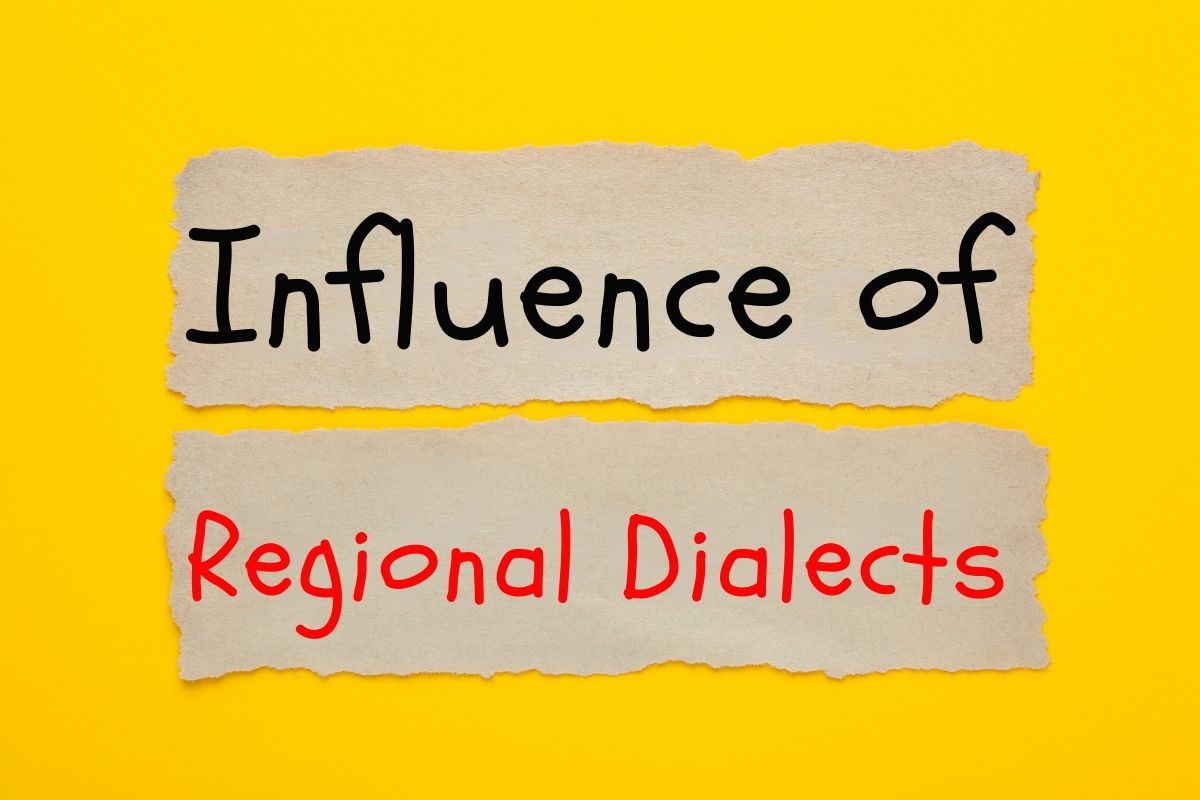
Regional dialects and variations in language usage can also contribute to the confusion between “sale” and “sell.”
Different regions may have unique linguistic patterns or colloquialisms that blur the distinction between these terms.
This regional influence can make it challenging for individuals to grasp the precise usage of “sale” and “sell.”
The confusion between “sale” and “sell” stems from factors such as their similar pronunciation, overlapping meanings, lack of awareness, colloquial language usage, and regional dialects.
By recognizing these reasons, we can address the confusion and emphasize the importance of using the correct term in appropriate contexts.
Through education and practice, individuals can enhance their communication skills and avoid misunderstandings related to “sale” and “sell.”
Conclusion
Understanding the differences between “sale” and “sell” is essential for effective communication.
By using these terms appropriately, you can convey your message accurately in various contexts, whether discussing promotions, commercial transactions, or personal exchanges.

Hi, welcome to my blog! My name is Omid and I am thrilled to have you here! I am an English language teacher with 12 years of experience and hold multiple international certifications (TESOL, IELTS, TOEFL, PTE, CELTA). Additionally, I hold a PhD in Applied Linguistics with a specialization in Teaching English as a Second Language (TESL), which fuels my passion for teaching English and assisting others in mastering the language. To me, nothing is more rewarding than helping individuals enhance their English language abilities through various methods. So, let’s embark on this journey of learning English together.

